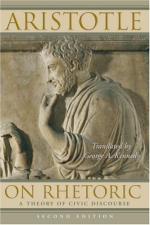
|
| Name: _________________________ | Period: ___________________ |
This quiz consists of 5 multiple choice and 5 short answer questions through Book III, Chapter 10-12.
Multiple Choice Questions
1. To object to an argument, whose authority did Aristotle think could be appealed to?
(a) A well known writer or lawyer.
(b) A well known writer or judge.
(c) A respected writer or lawyer.
(d) A respected writer or judge.
2. As explained in Book I, Chapter 10, what did the general law refer to?
(a) Unwritten laws of necessity.
(b) Written laws of necessity.
(c) Unwritten laws of justice.
(d) Written laws of justice.
3. How many non-technical means of persuasion did Aristotle discuss in Book I, Chapter 15?
(a) Five.
(b) Four.
(c) Three.
(d) Two.
4. Which of the following did Aristotle think were more likely to commit crimes?
(a) Clever people.
(b) Ignorant people.
(c) Weak people.
(d) Malicious people.
5. What did Aristotle say was the chief concern of political rhetoric?
(a) What is useful.
(b) What is feasable.
(c) What is arguable.
(d) What is obvious.
Short Answer Questions
1. Which tactic was not included as something that an epideictic rhetorician might use?
2. In Aristotle's opinion, why were many people not swayed by sound arguments?
3. Which of the following was a reason that Aristotle included as a cause of pity?
4. According to Aristotle, what was epideictic rhetoric most likely to deal with?
5. What types of examples did Aristotle discuss in Book II, Chapter 20?
|
This section contains 258 words (approx. 1 page at 300 words per page) |

|




